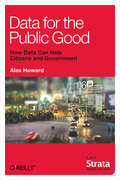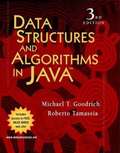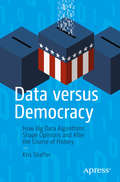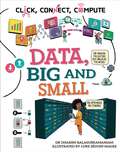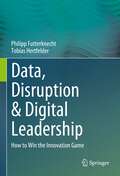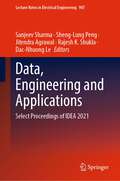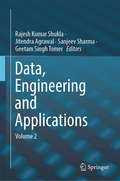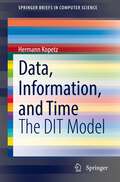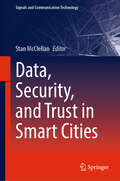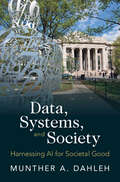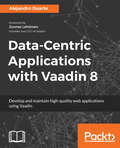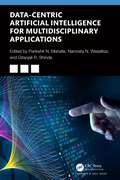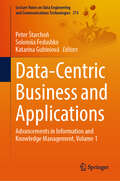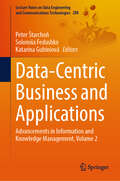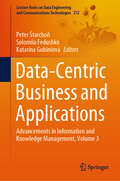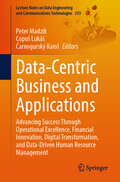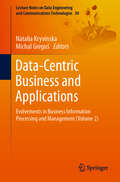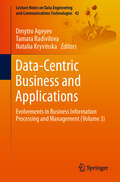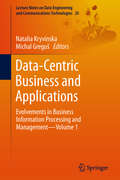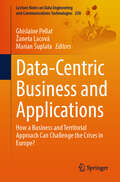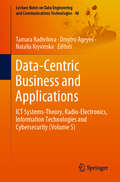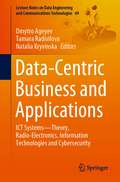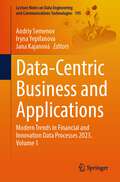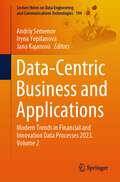- Table View
- List View
Data for the Public Good: How Data Can Help Citizens and Government
by Alex HowardAs we move into an era of unprecedented volumes of data and computing power, the benefits aren't for business alone. Data can help citizens access government, hold it accountable and build new services to help themselves. Simply making data available is not sufficient. The use of data for the public good is being driven by a distributed community of media, nonprofits, academics and civic advocates.This report from O'Reilly Radar highlights the principles of data in the public good, and surveys areas where data is already being used to great effect, covering: Consumer financeTransit dataGovernment transparencyData journalismAid and developmentCrisis and emergency responseHealthcare
Data structures and Algorithms in Java: 3rd edition
by Micheal T. Goodrich Roberto TamassiaThis edition is designed to provide an introduction to data structures and algorithms, including their design, analysis, and implementation. <P><P><i>Advisory: Bookshare has learned that this book offers only partial accessibility. We have kept it in the collection because it is useful for some of our members. Benetech is actively working on projects to improve accessibility issues such as these.</i>
Data versus Democracy: How Big Data Algorithms Shape Opinions and Alter the Course of History
by Kris ShafferHuman attention is in the highest demand it has ever been. The drastic increase in available information has compelled individuals to find a way to sift through the media that is literally at their fingertips. Content recommendation systems have emerged as the technological solution to this social and informational problem, but they’ve also created a bigger crisis in confirming our biases by showing us only, and exactly, what it predicts we want to see. Data versus Democracy investigates and explores how, in the era of social media, human cognition, algorithmic recommendation systems, and human psychology are all working together to reinforce (and exaggerate) human bias. The dangerous confluence of these factors is driving media narratives, influencing opinions, and possibly changing election results. In this book, algorithmic recommendations, clickbait, familiarity bias, propaganda, and other pivotal concepts are analyzed and then expanded upon via fascinating and timely case studies: the 2016 US presidential election, Ferguson, GamerGate, international political movements, and more events that come to affect every one of us. What are the implications of how we engage with information in the digital age? Data versus Democracy explores this topic and an abundance of related crucial questions. We live in a culture vastly different from any that has come before. In a society where engagement is currency, we are the product. Understanding the value of our attention, how organizations operate based on this concept, and how engagement can be used against our best interests is essential in responsibly equipping ourselves against the perils of disinformation.Who This Book Is ForIndividuals who are curious about how social media algorithms work and how they can be manipulated to influence culture. Social media managers, data scientists, data administrators, and educators will find this book particularly relevant to their work.
Data, Architecture and the Experience of Place
by Anastasia KarandinouThe notion of data is increasingly encountered in spatial, creative and cultural studies. Big data and artificial intelligence are significantly influencing a number of disciplines. Processes, methods and vocabularies from sciences, architecture, arts are borrowed, discussed and tweaked, and new cross-disciplinary fields emerge. More and more, artists and designers are drawing on hard data to interpret the world and to create meaningful, sensuous environments. Architects are using neurophysiological data to improve their understanding of people’s experiences in built spaces. Different disciplines collaborate with scientists to visualise data in different and creative ways, revealing new connections, interpretations and readings. This often demonstrates a genuine desire to comprehend human behaviour and experience and to – possibly – inform design processes accordingly. At the same time, this opens up questions as to why this desire and curiosity is emerging now, how it relates to recent technological advances and how it converses with the cultural, philosophical and methodological context of the disciplines with which it engages. Questions are also raised as to how the use of data and data-informed methods may serve, support, promote and/or challenge political agendas. Data, Architecture and the Experience of Place provides an overview of new approaches on this significant subject and is ideal for students and researchers in digital architecture, architectural theory, design, digital media, sensory studies and related fields.
Data, Big and Small (Click, Connect, Compute #3)
by Dharini BalasubramaniamData science fundamentals, using clear, expert explanations and comic illustrations to spark interest and enthusiasm in the next generation of computer scientists!Data, Big and Small delves into the details behind computer science data and information, which help people and organisations to make decisions. Learn how and why data are created, stored and shared. Find out how we make sense of information through graphs, maps and pictures, and understand how machines learn from the data that we feed them. The end of the book fast-forwards to the future of computer science, data and robotics, and considers what it might mean to live in a 'smarter' world.Contents: What are data? / Data, information and knowledge / Data are vital / Where do data come from? / Getting the format right / Storing all those data / The value is in the processing / Picture it! / Big data / Getting the most out of data / Keeping data secure / A trip into the future of data ... / Pioneer portraits / Further information / Glossary / Quiz yourself! / IndexThe Click, Connect, Compute series untangles the computer science web and teaches children about the essentials of computer software, hardware and digital literacy as well as discussing the ethics surrounding this evolving field. Featuring fun, friendly comic strip illustrations, pioneer bios and a quiz, this is a perfect read for children aged 8+.Books in the series: Computer Science Essentials / Data, Big and Small / Smart Machines / The Languages of ProgrammingWritten in a clear, thoughtful way by computer science expert, Dr. Dharini Balasubramaniam, a strong advocate for ethics and education in her field.
Data, Disruption & Digital Leadership: How to Win the Innovation Game
by Tobias Hertfelder Philipp FutterknechtSince the theory of relativity we know that massive objects attract things by their gravitation. The greater the mass, the greater the force of attraction. It is the same in strategy projects. Each project participant is a massive participant and has an impact on the interaction. What has changed dramatically is the influence of data on this process. Those who do not take this into account will suffer enormous losses in the future. As this change creates a new equilibrium, the chances of success of the methods and behaviors used also change. In this book, you will learn how to master this change and what you need to do so.
Data, Engineering and Applications: Select Proceedings of IDEA 2021 (Lecture Notes in Electrical Engineering #907)
by Sheng-Lung Peng Dac-Nhuong Le Jitendra Agrawal Sanjeev Sharma Rajesh K. ShuklaThe book contains select proceedings of the 3rd International Conference on Data, Engineering, and Applications (IDEA 2021). It includes papers from experts in industry and academia that address state-of-the-art research in the areas of big data, data mining, machine learning, data science, and their associated learning systems and applications. This book will be a valuable reference guide for all graduate students, researchers, and scientists interested in exploring the potential of big data applications.
Data, Engineering and Applications: Volume 2
by Rajesh Kumar Shukla Jitendra Agrawal Sanjeev Sharma Geetam Singh TomerThis book presents a compilation of current trends, technologies, and challenges in connection with Big Data. Many fields of science and engineering are data-driven, or generate huge amounts of data that are ripe for the picking. There are now more sources of data than ever before, and more means of capturing data. At the same time, the sheer volume and complexity of the data have sparked new developments, where many Big Data problems require new solutions. Given its scope, the book offers a valuable reference guide for all graduate students, researchers, and scientists interested in exploring the potential of Big Data applications.
Data, Information, and Time: The DIT Model (SpringerBriefs in Computer Science)
by Hermann KopetzThis SpringerBrief presents the data- information-and-time (DIT) model that precisely clarifies the semantics behind the terms data, information and their relations to the passage of real time. According to the DIT model a data item is a symbol that appears as a pattern (e.g., visual, sound, gesture, or any bit pattern) in physical space. It is generated by a human or a machine in the current contextual situation and is linked to a concept in the human mind or a set of operations of a machine. An information item delivers the sense or the idea that a human mind extracts out of a given natural language proposition that contains meaningful data items. Since the given tangible, intangible and temporal context are part of the explanation of a data item, a change of context can have an effect on the meaning of data and the sense of a proposition. The DIT model provides a framework to show how the flow of time can change the truth-value of a proposition. This book compares our notions of data, information, and time in differing contexts: in human communication, in the operation of a computer system and in a biological system. In the final Section a few simple examples demonstrate how the lessons learned from the DIT-model can help to improve the design of a computer system.
Data, Security, and Trust in Smart Cities (Signals and Communication Technology)
by Stan McClellanThis book provides a comprehensive perspective on issues related to the trustworthiness of information in the emerging “Smart City.” Interrelated topics associated with the veracity of information are presented and discussed by authors with authoritative perspectives from multiple fields. The focus on security, veracity, and trustworthiness of information, data, societal structure and related topics in connected cities is timely, important, and uniquely presented. The authors cover issues related to the proliferation of disinformation and the mechanics of trust in modern society. Topical issues include trust in technologies, such as the use of machine learning (ML) and artificial intelligence (AI), the importance of encryption and cybersecurity, and the value of protecting of critical infrastructure. Structural issues include legal and governmental institutions, including the basis and importance of these fundamental components of society. Functional issues also include issues of societal trust related to healthcare, medical practitioners, and the dependence on reliability of scientific results. Insightful background on the development of AI is provided, and the use of this compelling technology in applications spanning networks, supply chains, and business practices are discussed by practitioners with direct knowledge and convincing perspective. These thought-provoking opinions from notable industry, academia, medicine, law, and government leaders provide substantial benefit for a variety of stakeholders.
Data, Systems, and Society: Harnessing AI for Societal Good
by Munther A. DahlehHarnessing the power of data and AI methods to tackle complex societal challenges requires transdisciplinary collaborations across academia, industry, and government. In this compelling book, Munther A. Dahleh, founder of the MIT Institute for Data, Systems, and Society (IDSS), offers a blueprint for researchers, professionals, and institutions to create approaches to problems of high societal value using innovative, holistic, data-driven methods. Drawing on his experience at IDSS and knowledge of similar initiatives elsewhere, Dahleh describes in clear, non-technical language how statistics, data science, information and decision systems, and social and institutional behavior intersect across multiple domains. He illustrates key concepts with real-life examples from optimizing transportation to making healthcare decisions during pandemics to understanding the media's impact on elections and revolutions. Dahleh also incorporates crucial concepts such as robustness, causality, privacy, and ethics and shares key lessons learned about transdisciplinary communication and about unintended consequences of AI and algorithmic systems.
Data-Centric Applications with Vaadin 8: Develop and maintain high-quality web applications using Vaadin
by Alejandro DuarteThis book teaches you everything you need to know to create stunning Vaadin applications for all your web development needs. Deep dive into advanced Vaadin concepts while creating your very own sample Vaadin application.Key FeaturesA one-stop book to enhance your working knowledge with Vaadin.Explore and implement the architecture of Vaadin applications.Delve into advanced topics such as data binding, authentication and authorization to improvise your application’s performance.Book DescriptionVaadin is an open-source Java framework used to build modern user interfaces. Vaadin 8 simplifies application development and improves user experience. The book begins with an overview of the architecture of Vaadin applications and the way you can organize your code in modules.Then it moves to the more advanced topics about advanced topics such as internationalization, authentication, authorization, and database connectivity. The book also teaches you how to implement CRUD views, how to generate printable reports, and how to manage data with lazy loading.By the end of this book you will be able to architect, implement, and deploy stunning Vaadin applications, and have the knowledge to master web development with Vaadin.What you will learnModularize your Vaadin applications with MavenCreate high quality custom componentsImplement robust and secure authentication and authorization mechanismsConnect to SQL databases efficientlyDesign robust CRUD (Create, Read, Update, Delete) viewsGenerate stunning reportsImprove resource consumption by using lazy loadingWho this book is forIf you area Software developer with previous experience with Vaadin and would like to gain more comprehensive and advanced skills in Vaadin web development, then this book is for you.
Data-Centric Artificial Intelligence for Multidisciplinary Applications
by Parikshit N. Mahalle Gitanjali R. Shinde Namrata N. WasatkarThis book explores the need for a data‑centric AI approach and its application in the multidisciplinary domain, compared to a model‑centric approach. It examines the methodologies for data‑centric approaches, the use of data‑centric approaches in different domains, the need for edge AI and how it differs from cloud‑based AI. It discusses the new category of AI technology, "data‑centric AI" (DCAI), which focuses on comprehending, utilizing, and reaching conclusions from data. By adding machine learning and big data analytics tools, data‑centric AI modifies this by enabling it to learn from data rather than depending on algorithms. It can therefore make wiser choices and deliver more precise outcomes. Additionally, it has the potential to be significantly more scalable than conventional AI methods.• Includes a collection of case studies with experimentation results to adhere to the practical approaches• Examines challenges in dataset generation, synthetic datasets, analysis, and prediction algorithms in stochastic ways• Discusses methodologies to achieve accurate results by improving the quality of data• Comprises cases in healthcare and agriculture with implementation and impact of quality data in building AI applications
Data-Centric Business and Applications: Advancements in Information and Knowledge Management, Volume 1 (Lecture Notes on Data Engineering and Communications Technologies #213)
by Solomiia Fedushko Peter Štarchoň Katarína GubíniováThis book explores the profound impact of data on company operations, decision-making, and application development. The book delves into sophisticated information and knowledge management principles, including data governance, analytics, knowledge discovery, and artificial intelligence. The subject encompasses data-centric business models, emerging technology, and ethical considerations. Each chapter is authored by an expert in the area who offers important insights into the influence of data on the advancement of business and application development. The material herein is appropriate for a diverse audience, encompassing academics, practitioners, business professionals, and researchers. The editors sincerely appreciate the writers for their significant contributions, which have been crucial in developing an essential resource for studying and advancing data-centric businesses and applications.
Data-Centric Business and Applications: Advancements in Information and Knowledge Management, Volume 2 (Lecture Notes on Data Engineering and Communications Technologies #208)
by Solomiia Fedushko Peter Štarchoň Katarína GubíniováThis book stands out by exploring the significance of data in various aspects of business, including operations, decision-making, and application development, in a comprehensive and accessible manner. It delves into advanced topics such as data management, analytics, knowledge discovery, artificial intelligence, data-centric business models, emerging technologies, and ethical implications, providing a unique perspective. The book is appropriate for academics, professionals, and researchers with intermediate to advanced data management skills. Data plays a crucial role in today's rapidly evolving digital environment, serving as the foundation for businesses and the key element in driving innovation across diverse industries. This book delves into the latest advancements in data management, their impact on modern corporate settings, and advanced information and knowledge management concepts. The chapters in this book discuss various topics, including incorporating data-driven methods into business models, the difficulties and advantages of emerging technology, and the ethical aspects of making decisions based on data.
Data-Centric Business and Applications: Advancements in Information and Knowledge Management, Volume 3 (Lecture Notes on Data Engineering and Communications Technologies #212)
by Solomiia Fedushko Peter Štarchoň Katarína GubíniováEmbark on a journey into the future of business with a groundbreaking book that explores the dynamic interplay between data and business, unlocking its transformative power in strategy, decision-making, and application development. Dive deep into cutting-edge topics such as data governance, analytics, knowledge discovery, and AI, and gain an in-depth understanding of managing, analyzing, and extracting insights from complex data sets. This book's holistic approach sets this book apart, seamlessly integrating the latest information and knowledge management concepts. From integrating data-centric approaches into business models to addressing considerations in data-driven decisions, the diverse topics covered will provide invaluable insights into the central role of data in shaping the future of business and applications. This book sheds light on the ongoing advances in structural management, demonstrating how previously understood knowledge, technologies, and data can pave the way for sustainable solutions in the face of innovation, meet insight, and allow businesses to thrive in the digital age.
Data-Centric Business and Applications: Advancing Success Through Operational Excellence, Financial Innovation, Digital Transformation, and Data-Driven Human Resource Management (Lecture Notes on Data Engineering and Communications Technologies #253)
by Peter Madzík Copuš Lukáš Čarnogurský KarolThis book provides a comprehensive insight into contemporary management challenges shaped by digital transformation, operational excellence, and data-driven human resource strategies. It presents innovative frameworks for decision-making, workforce optimization, and financial innovation by integrating theoretical perspectives with real-world applications. With contributions from international scholars, it offers fresh perspectives on emerging technologies, sustainability, and business intelligence. Designed for academics, professionals, and policymakers, the book serves as a valuable resource for understanding and implementing effective management strategies in the digital era.
Data-Centric Business and Applications: Evolvements in Business Information Processing and Management (Volume 2) (Lecture Notes on Data Engineering and Communications Technologies #30)
by Natalia Kryvinska Michal GregušThis book explores various aspects of data engineering and information processing. In this second volume, the authors assess the challenges and opportunities involved in doing business with information. Their contributions on business information processing and management reflect diverse viewpoints – not only technological, but also business and social. As the global marketplace grows more and more complex due to the increasing availability of data, the information business is steadily gaining popularity and has a huge impact on modern society. Thus, there is a growing need for consensus on how business information can be created, accessed, used and managed.
Data-Centric Business and Applications: Evolvements in Business Information Processing and Management (Volume 3) (Lecture Notes on Data Engineering and Communications Technologies #42)
by Natalia Kryvinska Dmytro Ageyev Tamara RadivilovaBuilding on the authors’ previous work, this book addresses key processes and procedures used in information/data processing and management. Modern methods of business information processing, which draw on artificial intelligence, big data, and cloud-based storage and processing, are opening exciting new opportunities for doing business on the basis of information technologies. Thus, in this third book, the authors continue to explore various aspects – technological as well as business and social – of the information industries. Further, they analyze the challenges and opportunities entailed by these kinds of business.
Data-Centric Business and Applications: Evolvements in Business Information Processing and Management—Volume 1 (Lecture Notes on Data Engineering and Communications Technologies #20)
by Natalia Kryvinska Michal GregušThis book discusses processes and procedures in information/data processing and management. The global market is becoming more and more complex with an increased availability of data and information, and as a result doing business with information is becoming more popular, with a significant impact on modern society immensely. This means that there is a growing need for a common understanding of how to create, access, use and manage business information. As such this book explores different aspects of data and information processing, including information generation, representation, structuring, organization, storage, retrieval, navigation, human factors in information systems, and the use of information. It also analyzes the challenges and opportunities of doing business with information, and presents various perspectives on business information managing.
Data-Centric Business and Applications: How a Business and Territorial Approach Can Challenge the Crises in Europe? (Lecture Notes on Data Engineering and Communications Technologies #258)
by Ghislaine Pellat Marian Šuplata Žaneta LacováThe ERECO #European #Research #Community is an established network in interdisciplinary European research, bringing together 133 academics from 33 universities across the continent. Since 1994, ERECO has fostered a unique environment where economics, business, governance, technology, and culture meet to address the major transformations shaping Europe today. Driven by a belief that crises are moments for opportunity rather than decline, ERECO&’s researches offer forward-looking analyses on innovation, sustainability, regional resilience, and the future of work. Their collective expertise supports universities, public institutions, and businesses seeking to understand and anticipate Europe&’s next challenges. At a time when adaptability and vision are more critical than ever, ERECO positions itself as a strategic partner for those who aim to build a more resilient, inclusive, and future-ready Europe.
Data-Centric Business and Applications: ICT Systems-Theory, Radio-Electronics, Information Technologies and Cybersecurity (Volume 5) (Lecture Notes on Data Engineering and Communications Technologies #48)
by Natalia Kryvinska Dmytro Ageyev Tamara RadivilovaThis book addresses the challenges and opportunities of information/data processing and management. It also covers a range of methods, techniques and strategies for making it more efficient, approaches to increasing its usage, and ways to minimize information/data loss while improving customer satisfaction. Information and Communication Technologies (ICTs) and the Service Systems associated with them have had an enormous impact on businesses and our day-to-day lives over the past three decades, and continue to do so. This development has led to the emergence of new application areas and relevant disciplines, which in turn present new challenges and opportunities for service system usage. The book provides practical insights into various aspects of ICT technologies for service systems: Techniques for information/data processing and modeling in service systems Strategies for the provision of information/data processing and management Methods for collecting and analyzing information/data Applications, benefits, and challenges of service system implementation Solutions to increase the performance of various service systems using the latest ICT technologies
Data-Centric Business and Applications: ICT Systems—Theory, Radio-Electronics, Information Technologies and Cybersecurity (Lecture Notes on Data Engineering and Communications Technologies #69)
by Natalia Kryvinska Dmytro Ageyev Tamara RadivilovaThis book, building on the authors’ previous work, presents new communication and networking technologies, challenges and opportunities of information/data processing and transmission. It also discusses the development of more intelligent and efficient communication technologies, which are an essential part of current day-to-day life. Information and Communication Technologies (ICTs) have an enormous impact on businesses and our day-to-day lives over the past three decades and continue to do so. Modern methods of business information processing are opening exciting new opportunities for doing business on the basis of information technologies. The book contains research that spans a wide range of communication and networking technologies, including wireless sensor networks, optical and telecommunication networks, storage area networks, error-free transmission and signal processing.
Data-Centric Business and Applications: Modern Trends in Financial and Innovation Data Processes 2023. Volume 1 (Lecture Notes on Data Engineering and Communications Technologies #195)
by Andriy Semenov Iryna Yepifanova Jana KajanováThis book examines aspects of financial and investment processes, as well as the application of information technology mechanisms to business and industrial management, using the experience of the Ukrainian economy as an example. An effective tool for supporting business data processing is combining modern information technologies and the latest achievements in economic theory. The variety of industrial sectors studied supports the continuous acquisition and use of efficient business analysis in organizations. In addition, the book elaborates on multidisciplinary concepts, examples, and practices that can be useful for researching the evolution of developments in the field. Also, in this book, there is a description of analysis methods for making decisions in business, finance, and innovation management.
Data-Centric Business and Applications: Modern Trends in Financial and Innovation Data Processes 2023. Volume 2 (Lecture Notes on Data Engineering and Communications Technologies #194)
by Andriy Semenov Iryna Yepifanova Jana KajanováThis book examines aspects of financial and investment processes, as well as the application of information technology mechanisms to business and industrial management, using the experience of the Ukrainian economy as an example. An effective tool for supporting business data processing is combining modern information technologies and the latest achievements in economic theory. The variety of industrial sectors studied supports the continuous acquisition and use of efficient business analysis in organizations. In addition, the book elaborates on multidisciplinary concepts, examples, and practices that can be useful for researching the evolution of developments in the field. Also, in this book, there is a description of analysis methods for making decisions in business, finance, and innovation management.
